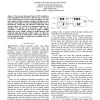Free Online Productivity Tools
i2Speak
i2Symbol
i2OCR
iTex2Img
iWeb2Print
iWeb2Shot
i2Type
iPdf2Split
iPdf2Merge
i2Bopomofo
i2Arabic
i2Style
i2Image
i2PDF
iLatex2Rtf
Sci2ools
INFOCOM
2009
IEEE
2009
IEEE
The Capacity Allocation Paradox
— The Capacity Allocation Paradox (CAP) destabilizes a stable small-buffer network when a link capacity is increased. CAP is demonstrated in a basic 2x1 network topology. We show that it applies to fluid, wormhole and packet-switched networks, and prove that it applies to various scheduling algorithms such as fixed-priority, round-robin and exhaustive round-robin. Their capacity regions are modeled and surprising phenomena are described. For instance, once increasing a link capacity destabilizes a stable network, increasing it further to infinity might never restore stability. Further, we exhibit networks with arbitrarily tight link-capacity stability regions, in which any small deviation from an optimal link capacity might make the network unstable. Finally, we suggest ways to mitigate CAP, e.g. by using GPS scheduling.
Capacity Allocation Paradox | Communications | INFOCOM 2009 | Link Capacity | Stable Small-buffer Network |
Related Content
| Added | 24 May 2010 |
| Updated | 24 May 2010 |
| Type | Conference |
| Year | 2009 |
| Where | INFOCOM |
| Authors | Asaf Baron, Ran Ginosar, Isaac Keslassy |
Comments (0)

